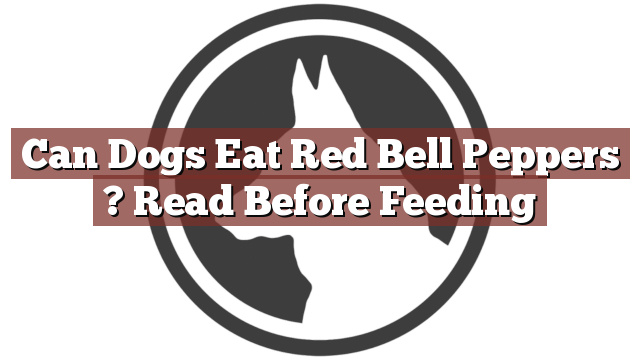Understanding Your Dog’s Dietary Needs
As responsible pet owners, it is crucial for us to understand our dog’s dietary needs and what foods are safe for them to consume. While dogs are primarily carnivores, they can benefit from certain fruits and vegetables in moderation. It is important to remember that a dog’s digestive system is different from ours, and some human foods can be harmful to them. Therefore, it is essential to educate ourselves about what foods are safe for our furry friends.
Can Dogs Eat Red Bell Peppers? Read Before Feeding
Can dogs eat red bell peppers? This is a common question among dog owners who are looking to introduce some variety into their pet’s diet. The answer is yes, dogs can indeed eat red bell peppers. Red bell peppers are a rich source of vitamins A, C, and E, as well as antioxidants that are beneficial for both humans and dogs. These vitamins help boost the immune system, improve vision health, and promote healthy skin and fur. However, it is important to note that not all dogs may respond well to red bell peppers, and some may experience digestive issues. Therefore, it is crucial to introduce them slowly and in small quantities to monitor your dog’s reaction.
Pros and Cons of Feeding Red Bell Peppers to Dogs
Feeding red bell peppers to your dog has its pros and cons. On the positive side, red bell peppers provide dogs with important vitamins and antioxidants that can support their overall health. They are low in calories and high in fiber, making them an excellent addition to your dog’s diet if they need to shed a few pounds. Additionally, red bell peppers are known to have anti-inflammatory properties, which can benefit dogs with joint issues or arthritis.
However, there are a few cons to consider as well. Some dogs may have a sensitive stomach, and introducing red bell peppers abruptly can cause digestive upset. It is crucial to monitor your dog’s stool and overall well-being when introducing any new food. Furthermore, it is important to only feed your dog raw or cooked red bell peppers. Avoid giving them any seasoned or spiced bell peppers, as certain seasonings can be harmful to dogs. Lastly, always remember that red bell peppers should only be given as a treat or a supplement to their regular balanced diet and should not replace their main source of nutrition.
In Conclusion: Making an Informed Decision About Red Bell Peppers for Your Dog
In conclusion, dogs can eat red bell peppers in moderation, and they can offer several health benefits. However, it is crucial to consider your dog’s individual needs and health conditions before introducing any new food into their diet. Always start with small quantities, monitor their reaction, and consult your veterinarian if you have any concerns. Remember, each dog is unique, and what may be safe for one dog might not be suitable for another. By being informed and making responsible decisions, we can ensure that our furry companions lead happy and healthy lives.
Thank you for taking the time to read through our exploration of [page_title]. As every dog lover knows, our furry friends have unique dietary needs and responses, often varying from one canine to another. This is why it's paramount to approach any changes in their diet with caution and knowledge.
Before introducing any new treats or making alterations to your dog's diet based on our insights, it's crucial to consult with a veterinarian about [page_title]. Their expertise ensures that the choices you make are well-suited to your particular pet's health and well-being.
Even seemingly harmless foods can sometimes lead to allergic reactions or digestive issues, which is why monitoring your dog after introducing any new food item is essential.
The content provided here on [page_title] is crafted with care, thorough research, and a genuine love for dogs. Nevertheless, it serves as a general guideline and should not be considered a substitute for professional veterinary advice.
Always prioritize the expert insights of your veterinarian, and remember that the health and happiness of your furry companion come first.
May your journey with your pet continue to be filled with joy, love, and safe culinary adventures. Happy reading, and even happier snacking for your canine friend!

